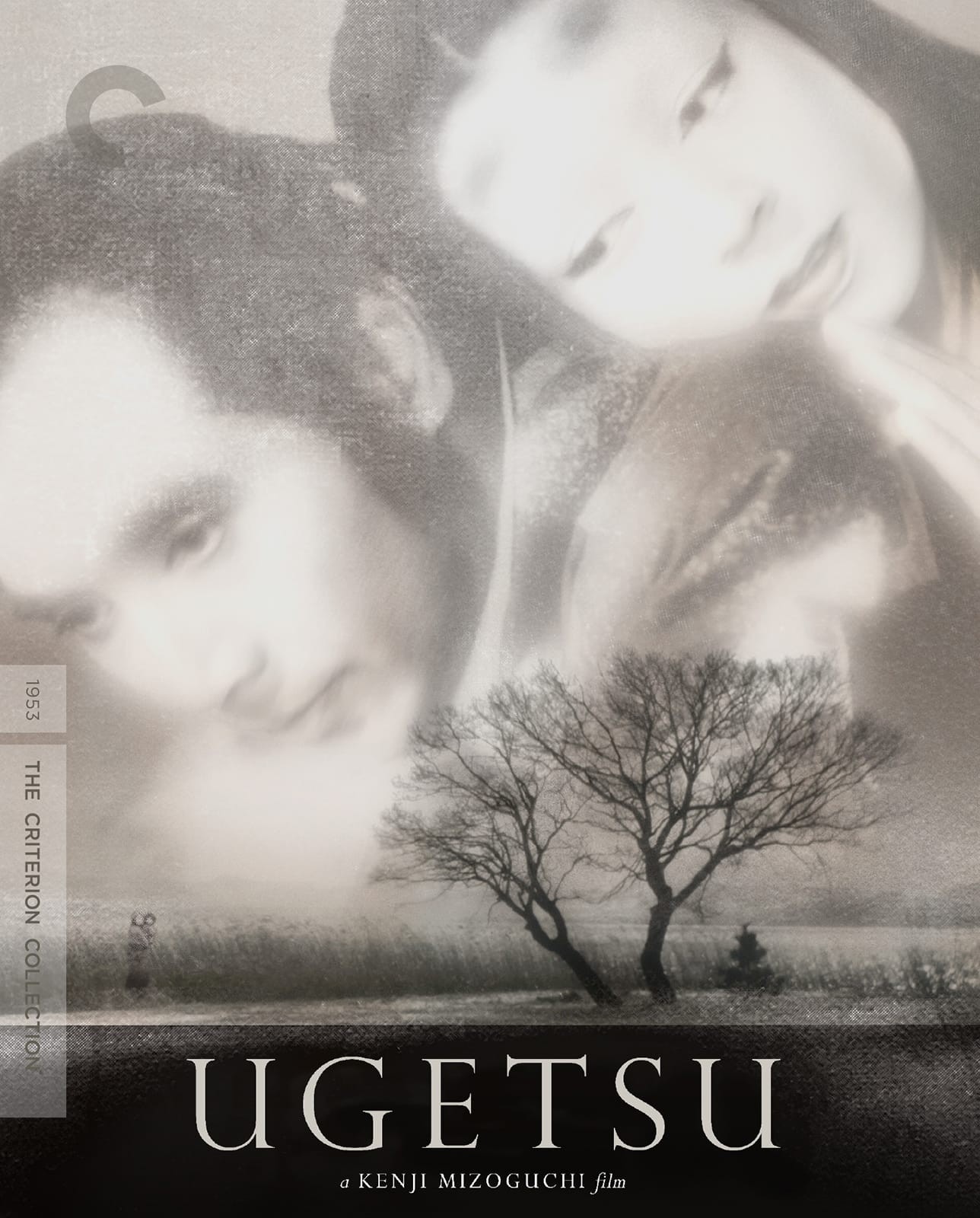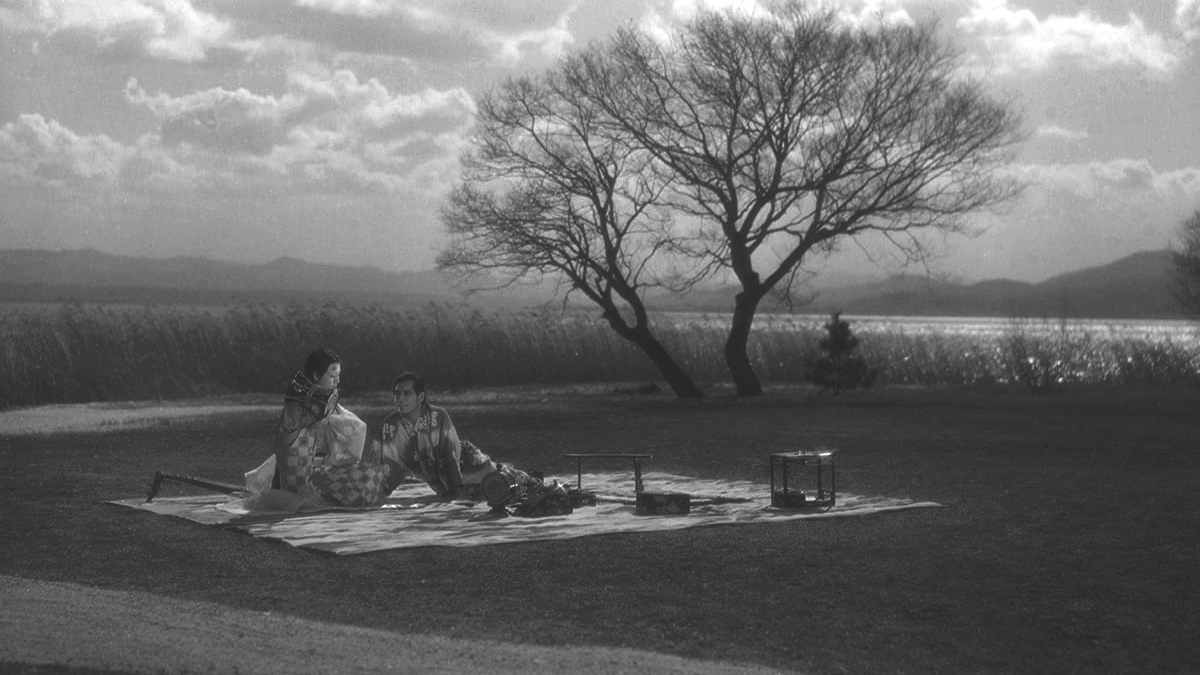Film and Plot Synopsis
Ugetsu is based on three short stories from Akinari Ueda and Guy de Maupassant’s Tales of Moonlight and Rain. This film takes place in 16th Century Japan. In a period of civil war, a pottery maker becomes obsessed with making money from his work. He risks the lives of himself and his family to earn as much gold as possible. However, when he leaves his family behind and journeys to a distant land, he encounters various dangers, both man made and supernatural, that give him a deeper appreciation for life and family.
‘Ugetsu’ Movie Summary
 Ugetsu begins in 16th Century Japan. It is a period of civil war where the countryside is filled with soldiers from both sides who prey upon the innocent civilians for their own pleasure and gain. In the farming village of Nakanogō, Genjūrō (Masayuki Mori), a potter by trade, takes his wares to the nearby town of Ōmizo. Genjūrō hopes to make some quick sales in order to make a lot of money for his wife and himself. He is accompanied by Tōbei (Eitaro Ozawa), another villager of limited means who dreams of becoming a samurai. While they are gone, the village elder (Ryōsuke Kagawa) advises Genjūrō’s wife, Miyagi (Kinuyo Tanaka) that it is not wise to seek profit in times of upheaval. He also warns her to tell her husband to prepare for an attack on the village because of soldiers rumored to be nearby.
Ugetsu begins in 16th Century Japan. It is a period of civil war where the countryside is filled with soldiers from both sides who prey upon the innocent civilians for their own pleasure and gain. In the farming village of Nakanogō, Genjūrō (Masayuki Mori), a potter by trade, takes his wares to the nearby town of Ōmizo. Genjūrō hopes to make some quick sales in order to make a lot of money for his wife and himself. He is accompanied by Tōbei (Eitaro Ozawa), another villager of limited means who dreams of becoming a samurai. While they are gone, the village elder (Ryōsuke Kagawa) advises Genjūrō’s wife, Miyagi (Kinuyo Tanaka) that it is not wise to seek profit in times of upheaval. He also warns her to tell her husband to prepare for an attack on the village because of soldiers rumored to be nearby.
However, when Genjūrō returns to his home with a lot of money and a new kimono for his wife, he has no concerns for the soldiers and focuses his time on making more pottery so he can make more money. Tōbei also returns after being rejected by every samurai in town because he has no weapons or armor. The two men makes plans to take an even bigger load of pottery into town and go about making it. They are in the process of firing the pottery when the village is attacked by soldiers who are kidnapping any men they find for forced labor. Many of the villagers run into the forest to hide, but Genjūrō returns because of his concern for his pottery. Genjūrō, Miyagi, Tōbei, and Tōbei’s wife Ohama (Mitsuko Mito) remove the pottery from the kiln and decide to take the pottery to a different marketplace. This time, they travel by water.
As the two couples travel across a lake, they encounter a boat emerging from a thick fog bank. The sole passenger (Ichirō Amano) tells them he was attacked by pirates and warns them to return to their homes before dying. The men decide to take the women back to the shore, but Ohama refuses to go. Miyagi begs her husband not to leave, but he only focuses on his task and leaves his wife and their young son, Gen’ichi (Ichisaburo Sawamura) on the shore before proceeding to the marketplace.
At the market, the pottery sells very well. Tōbei takes his share of the profits and runs off to buy armor and swords to follow his dream of being a samurai. Ohama chases after her husband, but she loses him in the crowd. She finds herself alone outside the market a short time later and is abducted by soldiers who rape her. After the rape, Ohama curses her husband for her misfortune and disgrace and returns to the marketplace.
Meanwhile, Genjūrō is visited by a mysterious noblewoman named Lady Wakasa (Machiko Kyô) and her nurse Ukon (Kikue Mōri), who order several pieces of pottery and direct him to deliver them to the Kutsuki mansion. Once there, Genjūrō learns that everyone in the mansion was killed by the local warlord’s soldiers except Lady Wakasa and her nurse. Lady Wakasa is familiar with Genjūrō’s work and lavishes him with compliments. Genjūrō becomes very enamored with Lady Wakasa and she convinces him to marry her.
Back at the village, Miyagi and Gen’ichi are barely getting by. A horde of hungry soldiers raid the town and Miyagi and Gen’ichi are forced to flee again. Before they leave, an old woman gives them food to eat on their journey. In the woods, Miyagi comes across more hungry soldiers who begin to search her for food. When they find food, they take it from her. She tries to get it back but she is stabbed by a soldier in the struggle. She desperately tries to continue on her way, but ultimately collapses with her young son still on her back.
Meanwhile, Tōbei seeks to join a samurai clan. He comes across a young samurai who has beheaded the general of an opposing clan. Tōbei kills the young samurai and steals the head, claiming it as his own kill. He presents the head to the commander of the victorious side and is rewarded with new armor, a horse, and a retinue. Tōbei rides into the marketplace with his new assignment of troops. Tōbei plans to find his wife and show her what kind of man he has become. When his men want to stop at the local brothel to celebrate his victory, he agrees. Once inside, he finds Ohama working as a prostitute after having lost her honor after the rape. Ohama says she wants to die, but Tōbei promises to buy back her honor.
Back at the marketplace, Genjūrō meets a priest who tells him that he sees death hovering over him. The priest tells him to return to his loved ones or he will certainly die. Genjūrō tells the priest of Lady Wakasa and the priest tells him that Wakasa died some time before, and it is her ghost that has seduced him. The priest tells him that he needs to exorcise the ghost from Genjūrō, and proceeds to paint Buddhist prayers on Genjūrō’s body to ward off the ghost.
That night at the Kutsuki mansion, Genjūrō confesses to Lady Wakasa that he is already married and has a son. He tells her that he wishes to return home to his family. However, Lady Wakasa will not let him go. Ukon admits that they are spirits and have returned to this world so Lady Wakasa could experience the joys of love, something she was not able to do while she was alive. Genjūrō grabs a sword and chases away the ghosts before throwing himself out of the mansion where he collapses unconscious. He is awoken the next morning by soldiers who accuse him of stealing the sword in his hand. When he tells the soldiers he got it from Kutsuki mansion, the soldiers laugh at him and tell him that the mansion burned down sometime before. Genjūrō looks around him and sees the charred remains of the mansion. The soldiers take the sword and his money. Genjūrō returns to his village, penniless.
Genjūrō returns to his home late at night. He initially finds the hut, which has been pillaged by the soldiers, empty, but when he looks a second time he finds Miyagi working by a fire. She embraces her husband and he tells her how much he has missed her and how right she was when she warned him about just being concerned about money. Gen’ichi is sleeping in the corner and Genjūrō hugs his sleeping son. Miyagi gives her husband some hot sake as he warms by the fire. Genjūrō is exhausted from his journey and falls asleep next to his son.
Genjūrō is awoken the next morning by the village elder knocking at the door. The elder explains how he has been taking care of his son while he was gone. Genjūrō calls for Miyagi, but the elder tells him that she was killed by the soldiers while he was gone. Genjūrō is puzzled and saddened. Meanwhile Tōbei and Ohama begin their journey back to the village from the marketplace. Tōbei throws his armor and his weapons into a river, saying that they have brought him nothing but trouble.
Shortly thereafter, Genjūrō apologizes to his wife by her grave while the spirit of Miyagi narrates that her husband has finally become the man that she always wished he would become and tells him that she will always be with him. The film ends with Genjūrō working with his son making pottery, finally content in his life. Tōbei and Ohama work together a short distance away as Ohama makes a meal for the four of them.
Additional Film Information
- Add the film to your collection today!
- Ugetsu Criterion webpage
- Peruse IMDb’s article on Ugetsu
- Learn more Ugetsu information at Wikipedia
- Read Ugetsu reviews from the folks at Rotten Tomatoes
Rate the Film!
Our Rating
Our Rating
Daiei Studios released Ugetsu on March 26, 1953. Kenji Mizoguchi directed the film starring Masayuki Mori, Machiko Kyô, and Kinuyo Tanaka.
